Novel by Neil Gaiman
Movie directed by Matthew Vaughn; screenplay by Jane Goldman & Matthew Vaughn; Starring Charlie Cox, Claire Danes, Michelle Pfeiffer, and Robert DeNiro
Stardust was my very first Neil Gaiman book. On the recommendation of Ana and a certain Greek who shall remain nameless, I picked up this slim novel, eager to see what all the fuss was about. At the time, I had heard that the book was in the process of becoming a movie–which always gets me going, as I am a stickler about reading books before watching movie adaptations.
A bit of history first: Initially, Stardust was released in four comic issues, illustrated by Charles Vess and published by DC Comics (VERTIGO), titled Stardust (Being A Romance Within the Realm of Faerie). Gaiman and Vess then collaborated on making Stardust into a “story book” (the illustrations pictured throughout this review are all done by Vess). After this initial book printing, Neil Gaiman wrote a traditional, non-illustrated novel version, which is the version I shall be discussing below. It should be noted also that a second printing of the illustrated book was released recently, and so if you are looking to get your hands on a copy of the Vertigo version, you should be able to without problems!
Stardust begins in the village of Wall–a small, rural English town, named for the large stone wall that runs to the east. The wall is guarded at all times by two watchmen, who are to ensure that no one passes through the small opening to the other side. For on the other side of the wall is a meadow, and beyond that is the realm of Faerie–many a traveller has tried to explore it (or refute its existence via exploration), only to end up lost forever. Once every nine years, the portal between Wall and Faerie is open, and humans can travel across to the market fair.
It is on one May Day market fair that our story begins. Young (decidedly un-romantic but ever so practical) Dunstan Thorn goes to the Faerie Market to buy a prize for his (equally practical and quite sensible) young lady friend, Daisy. Actually, I’m getting ahead of myself. The story actually begins thusly:
There once was a young man who wished to gain his Heart’s Desire.
And while that is, as beginnings go, not entirely novel (for every tale about every young man there ever was or will be could start in a similar manner) there was much about this young man and what happened to him that was unusual, although even he never knew the whole of it.
The story truly begins with the large influx of foreigners to Wall (they flock from all corners of the world to attend the Faerie Market), and one traveller rents Dunstan’s cottage for three days…for a price of a gold sovereign, silver sixpence, a copper penny, a farthing, and–since Dunstan insisted on payment in miracles and wonders–his Heart’s Desire; a gift that would carry on from Dunstan through to his children, should he have any.
Dunstan, freshly paid up, goes to the Faerie Market in the meadow the next day, with the intention of finding something sensible (preferably inexpensive) for his young lady friend, Daisy, and he settles upon a caravan selling trinkets. It is here that he sees a beautiful slave girl–with feline ears and violet slanted eyes–and he finds his Heart’s Desire. They make love that evening, and then Dunstan returns to the village of Wall, bringing home a crystal snowdrop for his all-but-forgotten human sweetheart (who later becomes his wife). Some months after, a little keepsake from that meadow moonlight tryst arrives for Dunstan Thorne–a basket is placed on the Wall side of the wall, with a baby boy by the name of Tristran Thorn.
Seventeen years later, Tristran is a shy, awkward young man, and our Intrepid Hero. Being half faerie and half human, he is prone to strange behavior (especially when the wind is blowing from the East), but has no idea of his origins (besides having one ear slightly pointed while the other is of the standard rounded variety, he is by all appearances a normal, shy young man). He, like every other man in the county, is in love with the beautiful (but vain and somewhat cruel–as some exceptionally beautiful people are wont to be) Victoria Forester. Unlike his father, Tristran is a true romantic. One fateful evening, while walking Victoria home from his family’s shop, a stiff wind blows from the East and bolsters Tristran’s confidence–they see a star fall across the night sky, and into the land behind the wall. Tristran, determined to prove his love for Victoria, tells her that he would do anything for her–including retrieve the falling star, for a kiss and her hand in marriage. Victoria takes him up on this, and tells Tristran she’ll give him whatever he desires, if he brings her back that same fallen star.
And Tristran, bolstered by this vow, runs home, tells his father that he must go East. Dunstan escorts his son to the wall, where he tells the two men on watch that it is time for his son to return (although Tristran has no idea why the watchmen let him through, nor does he know of his strange origins).
Thus, Tristran begins his journey, in which many strange and wondrous things happen. He meets a strange, hairy little man, and saves his life–in return the man gives Tristran a Babylon Candle, for fast travel. Tristan, as one of his gifts from his mother’s side, has an incredibly keen sense of direction. He lights the candle and walks toward his star. What he finds is an ethereally beautiful young woman, with a broken leg, crying, on the ground. The star. He slips a fine silver chain around her wrist to keep her by his side (not at all dissimilar to his mother’s slave chain), and, tuning out the star’s colorful insults, settles down for what looks to be a very long journey back to Wall, as the Babylon Candle has run too low to transport them home.
Yvaine is not at all happy with the situation–for who would like to be enslaved, and toted off (with a broken leg, no less) because of some vain woman’s behest? Tristran feels for the star–who much later tells him her name is Yvaine–and discovers that what he thinks he wants, and what his Heart’s Desire truly is, are two different things.
Meanwhile, other parties are interested in the fallen star–the Lilim, three very old and very powerful witches, are set on finding the star to cut out her heart. A shining star’s heart provides beauty and youth for the three, and they have all but run out of their last star’s. The eldest of the three consumes all the remaining heart, becoming younger and stronger and beautiful in her appearance, and sets off to find the new fallen star. The only catch is that any magic the eldest works undoes the power of the consumed heart, and so every spell she casts makes her turn older, uglier, and more feeble.
Also, there is a power struggle going on in the realm of Faerie, for the eighty-first Lord of Stormhold is on his deathbed. He had eight children from three wives, seven of his children are sons, of which four are dead (murdered by their brother Septimus, but still their ghosts are present), and three remain to fight over the throne. The father, to settle the struggle, throws his great topaz stone into the night, and tells his living sons that the only he who retrieves the stone will inherit the throne. And then they see the star fall, as the former Lord dies.
What ensues is a collision of the sons of Stormhold, the witch-queen, and a romantic boy with a lonely star (of course not also counting that same caravan and slave girl–who is not really just a slave girl–a great flying ship, talking trees, and a unicorn, amongst others), in a book that is pure magic.
Stardust truly is a fairy tale for adults, not without a certain edge or slight tang of bittersweetness, which makes the story all the more significant. What’s more, it is not just what Neil Gaiman says here that is awe-inspiring, but the way in which he says it. His lyrical, flowing prose here captures, embodies the magic that he writes of–and in my opinion is the cleanest, most beautifully written book of all his work that I’ve had the pleasure of reading. While Stardust might not be my favorite work of his, the author would be hard-pressed to top the poetic flair he imbues in this novel.
In 2007, a full length movie based on this book was released by Paramount Pictures, featuring a pretty darn solid cast (with the likes of Claire Danes, Robert De Niro, Michelle Pfeiffer, Charlie Cox, Sienna Miller, Rupert Everett, Ricky Gervais, and Sir Ian McKellen).
The movie version, as most movie versions do, takes liberties with the book, extrapolates on certain aspects, completely creates new segments, and features a more packageable ending.
That said, I enjoyed the movie thoroughly. Had Stardust the movie been made to match the book to the letter, it probably would not have been nearly as entertaining (there is some wonderful, nonsensical humor in the film that is not as prevalent in the book), and also probably would not have been as well received–neither at the box office, nor by the Dread Critics.
The movie begins similarly, with young Dunstan Thorn (the actor would later play Prince Caspian in this summer’s release), who manages to out-maneuver the single guard at the wall, and sneak into the forbidden land beyond. He sees the Faerie Market, and chances upon a caravan, run by an alluring slave girl. The story remains the same, except that this invocation of Dunstan never marries, and has no practical sweetheart waiting for him back at home. Nine months later, young Tristan (his name has been changed from “Tristran”) Thorn in his basket, arrives for Dunstan to care for. Only, in the movie, Tristan’s basket contains not just Tristan, but a letter from his mother explaining everything, and the gift of a Babylon candle. The ensuing events are nearly identical–to impress the snooty Victoria (played by a highly appropriate Sienna Miller), Tristan goes to Faerie to retrieve the fallen star (played by a whiny Claire Danes, who always does a scrunchy thing with her face).
My favorite modification that the movie made was concerning the Lilim–the role of the witch-queen, here named Lamia and played by the brilliant, deliciously eeeevil Michelle Pfeiffer. I have no desire to spoil the book or movie, but just know that the witch-queen plays a much larger role in the film, and the endings for this particular character (well…for all the characters really) are strikingly different.
Another notable addition was the extrapolation of the good Captain Johannes Alberic, of the Free Ship Perdita. In the book, the role of the lightning harvesting cloud-shipmen was brief indeed (although it is inferred that Tristran and Yvaine spend a good deal of time on the ship). The movie chooses to take massive creative license here, showing the budding love story grow between Tristan and Yvaine onboard, as well as taking the Captain’s role in a whole different direction. Played by the man’s man, Robert DeNiro–who no one would ever suspect would do what he does in this movie–Captain Shakespeare (another name change) is a ship captain that pretends to be a badass in front of his crew…but secretly likes to dress in drag and prance about. And it is a great dream of his to visit England–he pumps Tristan for information about the latest styles, news, plays, etc. Yes, this is a bit tacky, but sometimes tacky is fun. And…it’s Robert DeNiro.
As for the lead characters, I can’t say I was crazy about Claire Danes as Yvaine, but she did a fine job, if a bit overly whiny (and face-scrunchy). I adored Charlie Cox in the role of Tristan, however–his growth from awkward boy to fine, upstanding man comes alive onscreen. Plus, with all the other bigger name actors billed in the film, I liked the choice of a lesser known actor for the role.
What I felt the film excelled at was blending humor with the fantasy storyline, without becoming too hokey or cheesy. The director said he was aiming for a Princess Bride sort of feel–and, in my opinion, for the most part, he succeeded. The visuals and special effects were wonderful, the modifications to the storyline made this work on the big screen.
Rating:
Book: 8 Excellent A beautifully written fairy tale, and I highly recommend it, especially for any readers that may be wary of trying Neil Gaiman. Stardust is the perfect introduction to the author.
Movie: 7 Very Good The movie is different from the feel of the book, and takes some risks–but it definitely pays off. Highly enjoyable flick, and if you haven’t seen it, give it a rental already!

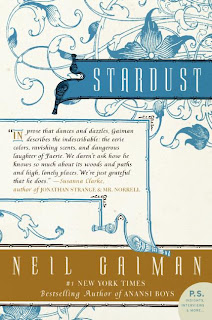
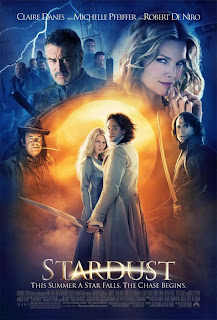
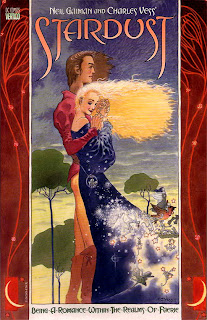

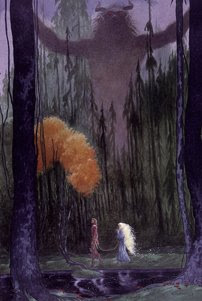
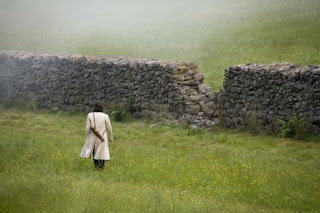
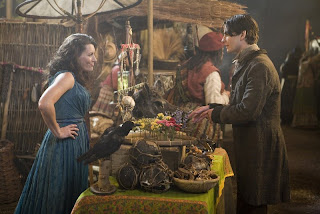
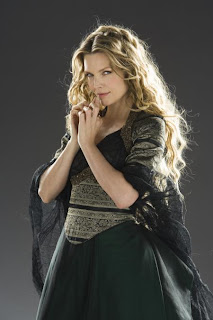

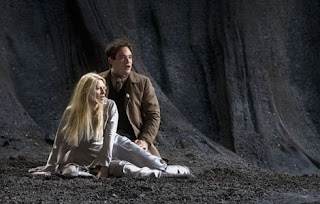









10 Comments
Ana
July 2, 2008 at 10:07 amAww It’s like reading/watching Stardust all over again. Amazing review Thea.
Stardust was my first Gaiman book as well: it The Greek – she who must not be named who MADE me read it last summer. I fell in love with the book and with the writing. I thought Gaiman was so bold in his fairytale – I mean, who the hell kills an unicorn????
Answer: Neil Gaiman.
I loved the movie too and I quite liked Claire Danes *runs*
Thea
July 2, 2008 at 10:19 amThe Greek is wise in her crafty ways *ninja*
Oh the unicorn–I probably should have mentioned that if anyone has a strong predisposition towards unicorns, they should be prepared. That was a wonderful, gory scene though.
And you want to know something weird? Every time I cut vegetables now (usually peppers for some reason), whenever I pull out a chopping knife, I always think of Stardust! I immediately think of it as my ‘great knife’ with which I shall cut out the pepper’s heart…
That’s kind of weird isn’t it? I’ll shut up now.
*ninja*
Ana
July 2, 2008 at 11:06 amLOL between my adoration of Lucifer and your great knifes I think we have enough reason to start a Book Smugglers mental corner – you know, where we are all weirdos and crazy. LOL
kmont
July 2, 2008 at 12:48 pmMUST watch this movie again sometime soon. I really enjoyed the book too.
Now, how to wrestle The Lion King away from the toddler long enough to watch Stardust??
Thea
July 2, 2008 at 1:40 pmNow, how to wrestle The Lion King away from the toddler long enough to watch Stardust??
Kmont, that’s a question for the ages.
Bribery with ice cream or some other sweet confection, perhaps? At least, that’s how I get my boyfriend away from the tv long enough for me to pop in Stardust :p
Christine
July 2, 2008 at 6:51 pmI have had Stardust on my shelf since before the movie even came to fruition. I have no idea why it sits there unread. Its not even a long novel. I haven’t seen the film adaptation either… will rent after I read the novel.
Josette
July 2, 2008 at 8:10 pmI’ve watched the Stardust movie for like, 5 or 6 times already! It’s definitely one of my favourite movies, one that I wouldn’t mind watching again and again. 🙂 The actors are superb and DeNiro played the hilarious Captain Shakespeare’s role very well. Pfeiffer was excellent too!
However, sad to say, I haven’t read the book yet!!! I’ve already bought a copy, though. 😀
Thea
July 2, 2008 at 10:49 pmChristine, definitely give the book a read, and then check out the movie! Both are wonderful, but very different in feel. I hope you enjoy them!
Josette 🙂 I really enjoyed Stardust as well–it really does feel like a more updated Princess Bride, and had me smiling and loving it all the way through. Definitely, definitely give the book a try too–it’s a different flavor than the movie, but still a breathtaking work of fantasy 🙂 I hope you like it!
Bev(QB)
July 5, 2008 at 4:32 amWell, you’ve done it now! I’ve of course HEARD of Neil Gaiman but chalked him up as sci-fi and never paid any closer attention. But I DO love Dark Fantasy and your review has me very, VERY intrigued.
I checked Audible and they’ve got Stardust in audio so I added it to my Audible wishlist. Uh, thanks… I think. hee
You know, it’s weird, but I don’t remember ever hearing of the movie.
Thea
July 5, 2008 at 3:20 pmOh Bev, this is indeed a fantasy with teeth–I think you’ll enjoy Stardust. I haven’t heard any reviews for the audio version, let me know what you think!
And I definitely recommend giving Stardust a rental at least. But, of course, only after you’ve read/heard the book 😉